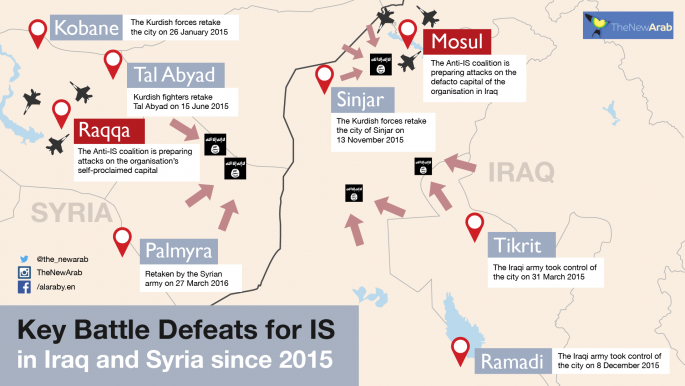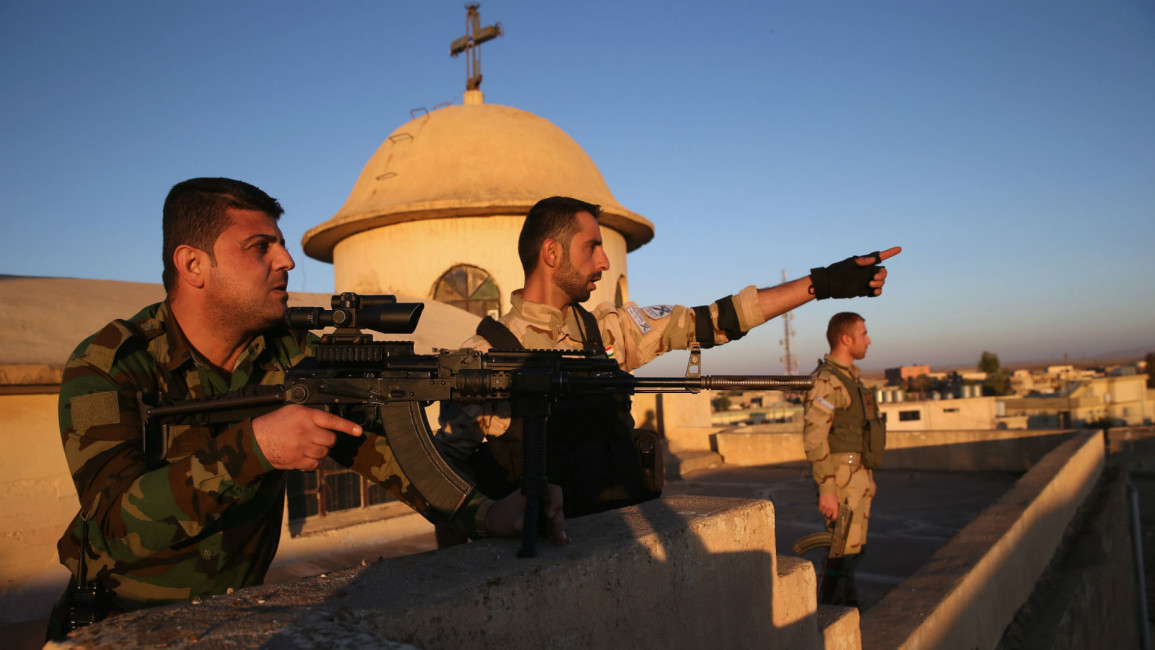'Self-defence' militias formed in southern Iraq to bolster security
'Self-defence' militias formed in southern Iraq to bolster security
Locals in southern Iraq are signing up to a new militia force which will take care of security in their neighbourhoods, as Iraqis lose confidence in the government.
2 min read
Iraqis are turning to militias to provide security in their areas [Getty]
More than 1,500 locals in southern Iraq and the capital Baghdad have formed "defence forces" to boost security in areas plagued by violence and bombings.
The move towards localised security forces comes after Baghdad's failed attempts to deal with the threat posed by terrorist groups, tribal leaders say.
It is also a sign of the rising power of militias in Iraq, with the national army becoming an increasingly sidelined force.
Bomb attacks
Baghdad and the Shia-majority south are becoming targets of suicide bombers from the Islamic State group.
The radical network occupies large parts of northern and western Iraq, and despises those who do not conform to their interpretation of Islam. This includes Iraq's Shia majority, religious minorities, and other Sunni groups who oppose it.
"The decision to volunteer came after appeals by tribal leaders to provide protection for our regions, after security forces failed to provide adequate security," Sheikh Abdul Salam, a tribal leader from al-Radhwaniya, told The New Arab.
"Outskirts of the capital have suffered greatly from violence and increasing instability, leading to a loss of life from resistance fighters," he added.
Volunteers will be trained at US-backed military bases across the country before taking up their security roles.
There is no information about what their tasks will be or who will lead the groups, but their primary role is likely be to provide security for civilian areas, which are becoming targets of Islamic State group militants.
Weakened and hardened
IS are are turning to suicide bombings to hit government areas after a series of losses to pro-Baghdad armed groups and Kurdish militias.
US air strikes have struck off a number of IS leaders - while other recruits have been killed on the battlefield - and the group appears to be falling back on its stronghold, Mosul city.
Numerous bombings have shook Baghdad in recent weeks, leading to the deaths of civilians and security forces alike.
On Thursday, five people were killed and 14 more injured when a bomb exploded at a funeral gathering in a south Baghdad graveyard.
On the same day, another suicide bomber targeted Iraqi forces in the southern Fallujah area, killing and injuring dozens.
Twin bombings in Baghdad also took place on 25 April killing 16 people with fears that IS are turning to weaker civilian targets and its militants are blending into the local population.
The move towards localised security forces comes after Baghdad's failed attempts to deal with the threat posed by terrorist groups, tribal leaders say.
It is also a sign of the rising power of militias in Iraq, with the national army becoming an increasingly sidelined force.
Bomb attacks
Baghdad and the Shia-majority south are becoming targets of suicide bombers from the Islamic State group.
The radical network occupies large parts of northern and western Iraq, and despises those who do not conform to their interpretation of Islam. This includes Iraq's Shia majority, religious minorities, and other Sunni groups who oppose it.
"The decision to volunteer came after appeals by tribal leaders to provide protection for our regions, after security forces failed to provide adequate security," Sheikh Abdul Salam, a tribal leader from al-Radhwaniya, told The New Arab.
"Outskirts of the capital have suffered greatly from violence and increasing instability, leading to a loss of life from resistance fighters," he added.
Volunteers will be trained at US-backed military bases across the country before taking up their security roles.
 |
There is no information about what their tasks will be or who will lead the groups, but their primary role is likely be to provide security for civilian areas, which are becoming targets of Islamic State group militants.
Weakened and hardened
IS are are turning to suicide bombings to hit government areas after a series of losses to pro-Baghdad armed groups and Kurdish militias.
US air strikes have struck off a number of IS leaders - while other recruits have been killed on the battlefield - and the group appears to be falling back on its stronghold, Mosul city.
Numerous bombings have shook Baghdad in recent weeks, leading to the deaths of civilians and security forces alike.
On Thursday, five people were killed and 14 more injured when a bomb exploded at a funeral gathering in a south Baghdad graveyard.
On the same day, another suicide bomber targeted Iraqi forces in the southern Fallujah area, killing and injuring dozens.
Twin bombings in Baghdad also took place on 25 April killing 16 people with fears that IS are turning to weaker civilian targets and its militants are blending into the local population.


![President Pezeshkian has denounced Israel's attacks on Lebanon [Getty]](/sites/default/files/styles/image_684x385/public/2173482924.jpeg?h=a5f2f23a&itok=q3evVtko)



 Follow the Middle East's top stories in English at The New Arab on Google News
Follow the Middle East's top stories in English at The New Arab on Google News


